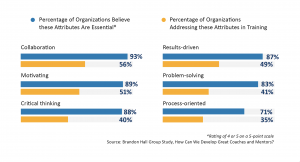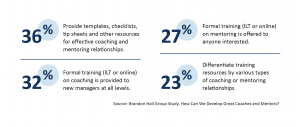
Only 30 percent of employers rate coaching and mentoring in their organizations as good or excellent, according to Brandon Hall Group’s study, How Can We Develop Great Coaches and Mentors. Less than half (46 percent) believe developing workplace coaches and mentors are important or critical to their business and talent strategies.
Coaching and mentoring are vital ways to extend learning and training beyond the classroom and create an environment of continuous and personalized learning. But employers that use internal coaches, as opposed to professional and often-certified external coaches, must ensure coaches and mentors have the training they need to deliver value. Brandon Hall Group’s research revealed six key attributes for coaching. Most organizations say they are essential, but only collaboration and motivation were addressed by more than half of the organizations surveyed.
Organizations Training Coaches on Key Attributes

Employers tend to be dysfunctional when it comes to coaching and mentoring. Brandon Hall Group asks about the importance of coaching and mentoring in several of our studies because it relates to learning, performance management, leadership development, engagement, and more. Consistently, between 50 percent and 75 percent of organizations rate coaching and mentoring as important or critical. But when it comes to actually develop coaches and mentors, organizations struggle, so the quality of coaching and mentoring is uneven.
Learning Resources Provided for Coaches and Mentors

Key Questions
- How can coaching and mentoring help us improve learning, performance, engagement, and other processes that can produce a positive business impact?
- How can we build a culture of continuous learning and coaching and mentoring?
- How can we improve the way we prepare employees to be great coaches and mentors?
- How can we understand the impact coaching and mentoring have on employees and the business?
Brandon Hall Group’s POV
Here are six high-level strategies that will help build a culture of coaching and mentoring and develop great coaches and mentors.
Differentiate Between Types of Coaching and Mentoring
In discussions and reports like this one, we often refer to coaching and mentoring in the abstract, as if they were just two things. But there are many facets of coaching and mentoring. A manager coaching employee performance is different than career coaching or coaching leaders. Mentoring, while often mentioned together with coaching, has a different function and purpose. Employers must understand those differences and the specific skills and capabilities needed.
Establish Coaching and Mentoring in Stages Based on Business Needs
Consider your business goals and prioritize coaching and mentoring based on those goals. For instance, developing inclusive leaders is a high priority for many organizations. In that case, consider developing coaches and mentors for your leaders as your first priority. Also, consider using an outside vendor or combine external and internal coaching to reach your goals.
Communicate Value and Process for Everyone Involved
If coaching and mentoring is not part of your culture, you can’t introduce it and expect it to immediately resonate without a strategic communication campaign. Even if coaching and mentoring are somewhat developed, communication and reinforcement are important. Strategies to consider include:
- Develop and publicize guidelines for effective coaching and mentoring (in different situations) for coaches and mentors and coaches/mentees
- Provide employees with guidelines for maximizing the value of coaching and their roles in its success.
Focus Training on Specific Attributes
These attributes have been correlated with successful mentors in Brandon Hall Group research: Authentic, deliberate, patient, empathetic, active listener, and consultative.
These behaviors should be found in workplace training for coaches: Critical thinking, problem-solving, process-oriented, results-driven, collaborative and motivating.
You can add or substitute other attributes that fit your situation but it’s important to go beyond the process of coaching and mentoring to communicate the behaviors and traits that drive success.
Leverage Technology
Having portals, apps or dedicated platforms for connecting and assisting coaches/coaches and mentors/mentees is vital for any efforts made at scale. Any large or growing organization should examine the current crop of coaching and mentoring software and take full advantage.
Measure, Measure, Measure
The value of coaching and mentoring can best be measured by comparing indicators between those who are coached and mentored and those who are not. Good metrics include differences in retention rates, engagement, employee satisfaction, performance ratings, and promotion rates.
Click here for information on Brandon Hall Group’s Professional Certification Program




